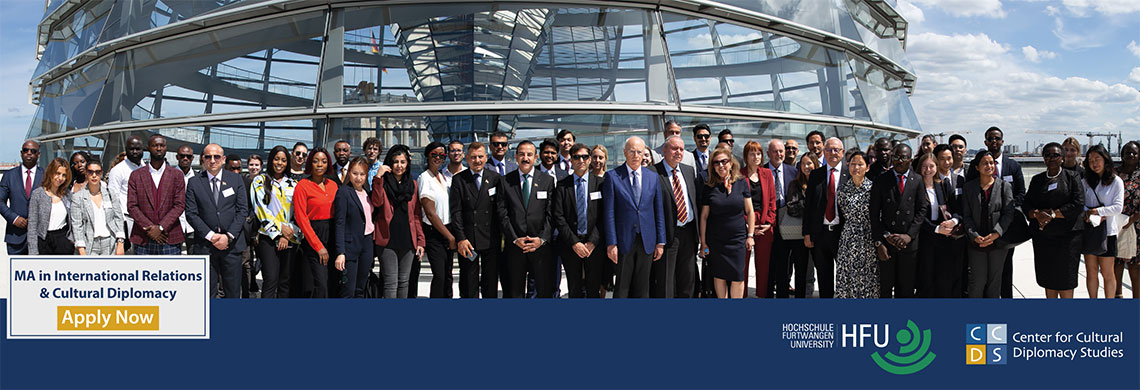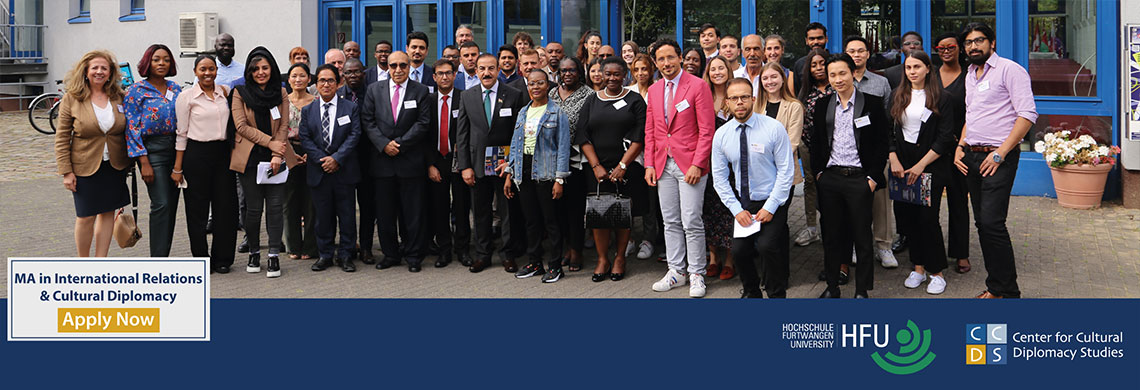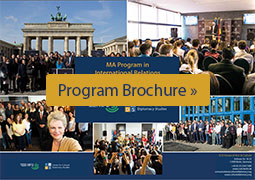The Center for Cultural Diplomacy Studies
MA Program in International Relations & Cultural Diplomacy (Short Track)
MA Program in International Relations & Cultural Diplomacy (Short Track)
Introduction
The MA Program in International Relations and Cultural Diplomacy is a 3 Semesters´ Master program offered by the Furtwangen University in partnership with the Academy for Cultural Diplomacy.Length- 2 Study Semesters + Master Thesis Writing Semester
Location- Berlin, Germany
Professional Development - The Professional Development Training Program provides students with the opportunity to apply in practice what they learn in theory in their studies and gain valuable professional experience. The program is completed throughout the program duration.
Tuition - €9,000
The degree provides a comprehensive foundation of studies through a unique blend of academic education in international relations, political science and multiple academic fields, related to the unique relationships that exist between various nations and cultures & the interaction of nation-states and non-governmental organisations in fields such as politics, economics, security and culture. A particular emphasis is put on succesful strategies, policies and practices of cultural diplomacy for the achievement of international and transnational co-operation & soft power objectives, whether in the public sector, private sector or civil society. The curriculum provides students with expertise in two distinct academic fields, combining both an academic and practical advantage in the global arena, and preparing them for careers in diverse fields such as international relations, politics, international business, the humanities and culture.
The program addresses contemporary international issues, with classroom seminars and lectures, as well as educational & cultural events, conferences, professional trainings, tours, visits and meetings with foreign officials, which are further incorporated into the curriculum. Students meet with leading experts working in international organizations, embassies, and academic institutions, and engage with specialists in the areas of international relations & economics, business, communication, politics, human rights, culture, peace building, multilateral diplomacy, conflict resolution and development.
The program also provides students with practical experience and prepares students for careers in the above-mentioned diverse fields. On a practical level, the international environment of the Center for Cultural Diplomacy Studies offers students a unique opportunity to interact with leading experts and academics at a wide variety of international organisations and research centers. Students are empowered as critical partners, working with peers and university staff to define, develop and transform the learning environment and their own learning experience. They act as collaborators and co-creators in the production of knowledge, engaging in research and investigation throughout their program of study. This exceptional learning environment leads to original research and independent study opportunities. It allows students to create a solid professional network and form a concrete base for future academic and professional career choices, preparing students for engagement in the international arena, in the private sector, the civil society, politics, governmental organisations and international economic organisations.
Start Dates »
Enrolments to the Program are possible towards the fall, winter, spring and summer semesters’ start each year. To learn about the Start Dates », please click HERE.
Professional Development Program »The Professional Development Program was created and developed in order to equip students with the relevant skill sets, knowledge, professional experience and professional relationships, so that they will be able to acquire a job immediately upon completion of the degree. One of the main goals of the Professional Development program is to enable students to acquire job opportunities and develop their careers in institutions such as the UN, EU, African Union, national governments, national parliaments, international corporations and international NGOs. (More) |
Program Structure
The program consists of 90 ECTS credits in total and has duration of two semesters, a Professional Development Training Program, designed individually for each student and a thesis to be written during the 3rd semester and to be submitted towards the completion of the program.
The program follows the conventional university structure of 3 Semesters: one academic year divided into two study semesters, where Students are offered facultative courses to accompany mandatory courses, a professional development experience, and the final thesis to be submitted after the 3rd semester, which is dedicated to the thesis writing.
*The program is structured as a 3 Semesters’ program, however Students who wish to finalize the program earlier, are able to submit their thesis prior to the final deadline (priorto the end of the third semester).
Program Curriculum
Semester 1 (30 Credits)
The main priority of the curriculum for the first semester is to provide students with a solid foundation and understanding of the history and contemporary practice of Cultural Diplomacy & International Relations, as well as future applications of the field.Mandatory Courses for Semester One are:
- The History and Evolution of the Field of Cultural Diplomacy
- International Case Studies of applied Cultural Diplomacy
- Future Trends in International Relations and Cultural Diplomacy
- Nation Branding and Unilateral Cultural Diplomacy
- International Organizations
- Soft Power, Hard Power and Smart Power
- Cultural Diplomacy in Conflict Zones
- European Studies & Politics
- International Governance: Trade, Finance and Common Pool Resources
Semester 2 (30 Credits)
Mandatory Courses for Semester Two are:- Module International Relations
- International Relations
- Module International Political Economy
- International Political Economy
- Module International Financial Markets and Institutions
- Module International Financial Markets and Institutions
- Module International Communication
- Intercultural Communication
- Managing Cultural Diversity
- Module International Strategic Management
- International Business Strategy
- Business Simulation
- Module Master Thesis
- Academic Research and Writing
Professional Development Training Program (12 Credits)
The Professional Development Training Program provides students with the opportunity to apply in practice what they learn in theory in their studies and gain valuable professional experience. The program can be completed simultaneous to the students’ studies or before or after the second semester. The professional development program is designed individually with each of the students and is composed of part or all of the following main components:- Research
- Development of own Initiative / project, supported by the Center.
- Participating in and contributing to ICD’s Projects, Activities and Conferences
- Involvement in independent Initiatives
- Internship in external Organizations and Institutes
Master Thesis (18 Credits along with the Academic Research and Writing module)
Following two semesters of academic study, students will be qualified to write an in-depth analysis on the topic of their choice related to the theme of the program. Students are required to complete a master’s Dissertation during their fourth semester of study, and will be provided with guidance on how to choose an appropriate topic, how to identify and locate the necessary sources. The topic, structure, and length of each Dissertation will be subject to individual review and Faculty mentor approval.






